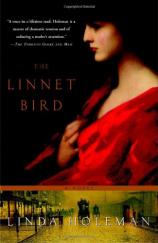Reading Group Guide
Discussion Questions
The Linnet Bird: A Novel

1. When Ram coerces Linny into working with the excuse, "Many a lass does help out her family when they've fallen on hard times," Linny reflects that her bloodline elevates her above this: "Of course I knew a number of the older girls . . . who worked a few hours now and then . . . when money was short at home. But I had always known I was different. I wasn't like them . . . It was in my blood, this difference" (p. 6). Where does Linny get this notion of inherited superiority? What later event marks her first doubt about the legitimacy of her noble blood?
2. After a fruitless visit from the Ladies of Righteous Conduct, Linny reflects "I turned thirteen and knew I had grown hard. And I knew my mother would not be pleased --- not because I was a whore, for that was not my fault --- but because of my evil ways and my even more evil thoughts" (p. 26). What is this evil she is talking about? What attempt does she make to rectify her ways?
3. What subversive act offers Linny a sense of "small potency" while she is subject to Ram's pimping? Why doesn't she try to hoard money instead?
4. Linny's position at the library is a dream come true: a first opportunity for legitimate employment and access to unlimited books. Why is there no description of her momentous first day at work?
5. Linny is disgusted with the pretensions and prejudices of the British in India, frustrated by the limitations placed on her exploration of her surroundings, uninterested in the rampant matchmaking culture, and unable to find compatible women with whom to make friends. Why, then, does she insist that "Faced with the thought of leaving India, of returning to Liverpool, I knew then that I would do whatever I had to. Marry someone. Anyone" (p. 224)?
6. Why does Shaker refer to Linny as "his sign"? What is her reaction to this label?
7. Linny is perceptive enough to notice that opium has reduced Meg from an ambitious, flamboyant character to a shadow of her former self, "worn and listless as all the other women . . . " (p. 383). She is also aware that laudanum, Meg's favorite antidote to all her child's complaints, is potentially fatal. Why does she ignore her misgivings and indulge in opium at Meg's urging? Is this a suicidal tendency, or mere stupidity?
8. After escaping prostitution, Linny is shocked when she sees her own reflection: "I didn't know the hollow-eyed woman in the mirror" (p. 103). Ten years later, at the peak of her opium addiction, she is again unable to recognize her reflection: "I looked at myself in the mirror again . . . I had lost sight of the woman who called herself Linny Gow" (p. 399). At the end of the novel, Linny claims, "I can again bear to look at my own reflection . . . I look like a mother, an ordinary woman" (p. 415). Discuss the use of mirrors and reflections elsewhere in the novel. Does Linny succeed in finding her true self, and, if so, where does she find this image reflected?
9. Linny makes one attempt at escaping the tedium of India. As she stands at the dock with her luggage, poised to leave, a sadhu, or holy man, speaks unintelligibly to her. Linny claims, "I understood the portent of the sadhu" (p. 232) and reverses her decision. Why does she choose to interpret the event this way?
10. Linny finds herself egging on Somers's violence: "for some inexplicable reason I sometimes found myself goading him purposely . . . I wanted to see how far I could push him before he would react . . . I think now . . . that it was a way of drawing Somers's attention --- even if the attention was filled with nothing more than trepidation and fear of physical pain. I wanted to reach him in some way, in the confusing push and pull of our relationship" (p. 271). In what ways is Linny's tale a timeless look at childhood and/or marital abuse and their psychological effects on a woman? What stereotypical behaviors does she fall into? What lesson does her story provide for healing and renewal?
11. Frances Gow, Linny's "soft and dreamy" dead mother, plays a recurring role in Linny's imagination. Frances's voice soothes Linny through her first rape at the age of eleven. Her face appears, albeit drowned, as Linny struggles against chloral poisoning during her ordeal on Rodney Street. Where else does she appear? What traits does Linny assign to Frances, and what strengths does she imagine she gleans from her upbringing at her mother's hands?
12. What "strange and troubling sensation of loss" does Linny experience when she leaves her life of prostitution behind?
The Linnet Bird: A Novel
- Publication Date: January 24, 2006
- Paperback: 432 pages
- Publisher: Three Rivers Press
- ISBN-10: 1400097401
- ISBN-13: 9781400097401








